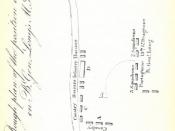In order to answer the question it is necessary to define each phrase in turn. Firstly, the idea of the law in relation to misrepresentation. A representation is 'a statement of fact made by one party to the contract (the representor) to the other (the representee) which, while not forming a term of the contract, is yet one of the reasons that induces the representee to enter into the contract' Cheshire, Fifoot and Furmston. It therefore follows that a misrepresentation is merely a representation that is untruthful. Subsequently, the phrase 'coach and four' can be interpreted, in this case, to mean 'destroys' or 'undermines' the 'venerated' or 'honoured' principle of caveat emptor. Caveat emptor itself is a highly recognised expression in the discipline of law, it is Latin for 'let the buyer beware' that is, let the buyer examine the article he is buying, and act on his own judgement.
The argument that needs to be addressed here is whether the law in relation to misrepresentation does undermine the principle of caveat emptor but if not, does it then fundamentally uphold it.
Historically there was a belief in a 'laissez faire' approach to law; that all men are equal in forming and implementing contracts. In this sense it was extensively upheld that the buyer themselves must take care to ensure that the goods (or whatever is the subject) that they are contracting over are free from defects of quality or condition, that is that the risk is borne by the purchaser and not by the seller. It was given that there were equal bargaining powers between the two parties contracting; however, this isn't always true. It was discovered in the doctrine of caveat emptor that the buyer was naturally disadvantaged by a lack of knowledge or expertise about what he...



Nice Work
I really liked it! good job!
2 out of 2 people found this comment useful.